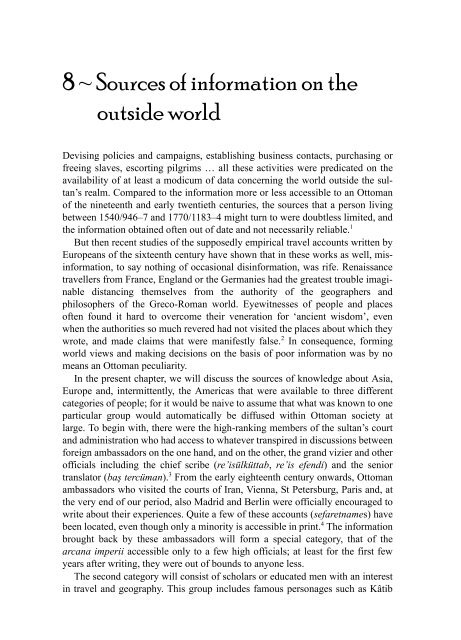The Ottoman Empire and the World Around It - Course Information
The Ottoman Empire and the World Around It - Course Information
The Ottoman Empire and the World Around It - Course Information
Create successful ePaper yourself
Turn your PDF publications into a flip-book with our unique Google optimized e-Paper software.
8 ~ Sources of information on <strong>the</strong><br />
outside world<br />
Devising policies <strong>and</strong> campaigns, establishing business contacts, purchasing or<br />
freeing slaves, escorting pilgrims … all <strong>the</strong>se activities were predicated on <strong>the</strong><br />
availability of at least a modicum of data concerning <strong>the</strong> world outside <strong>the</strong> sultan’s<br />
realm. Compared to <strong>the</strong> information more or less accessible to an <strong>Ottoman</strong><br />
of <strong>the</strong> nineteenth <strong>and</strong> early twentieth centuries, <strong>the</strong> sources that a person living<br />
between 1540/946–7 <strong>and</strong> 1770/1183–4 might turn to were doubtless limited, <strong>and</strong><br />
<strong>the</strong> information obtained often out of date <strong>and</strong> not necessarily reliable. 1<br />
But <strong>the</strong>n recent studies of <strong>the</strong> supposedly empirical travel accounts written by<br />
Europeans of <strong>the</strong> sixteenth century have shown that in <strong>the</strong>se works as well, misinformation,<br />
to say nothing of occasional disinformation, was rife. Renaissance<br />
travellers from France, Engl<strong>and</strong> or <strong>the</strong> Germanies had <strong>the</strong> greatest trouble imaginable<br />
distancing <strong>the</strong>mselves from <strong>the</strong> authority of <strong>the</strong> geographers <strong>and</strong><br />
philosophers of <strong>the</strong> Greco-Roman world. Eyewitnesses of people <strong>and</strong> places<br />
often found it hard to overcome <strong>the</strong>ir veneration for ‘ancient wisdom’, even<br />
when <strong>the</strong> authorities so much revered had not visited <strong>the</strong> places about which <strong>the</strong>y<br />
wrote, <strong>and</strong> made claims that were manifestly false. 2 In consequence, forming<br />
world views <strong>and</strong> making decisions on <strong>the</strong> basis of poor information was by no<br />
means an <strong>Ottoman</strong> peculiarity.<br />
In <strong>the</strong> present chapter, we will discuss <strong>the</strong> sources of knowledge about Asia,<br />
Europe <strong>and</strong>, intermittently, <strong>the</strong> Americas that were available to three different<br />
categories of people; for it would be naive to assume that what was known to one<br />
particular group would automatically be diffused within <strong>Ottoman</strong> society at<br />
large. To begin with, <strong>the</strong>re were <strong>the</strong> high-ranking members of <strong>the</strong> sultan’s court<br />
<strong>and</strong> administration who had access to whatever transpired in discussions between<br />
foreign ambassadors on <strong>the</strong> one h<strong>and</strong>, <strong>and</strong> on <strong>the</strong> o<strong>the</strong>r, <strong>the</strong> gr<strong>and</strong> vizier <strong>and</strong> o<strong>the</strong>r<br />
officials including <strong>the</strong> chief scribe (re’isülküttab, re’is efendi) <strong>and</strong> <strong>the</strong> senior<br />
translator (baş tercüman). 3 From <strong>the</strong> early eighteenth century onwards, <strong>Ottoman</strong><br />
ambassadors who visited <strong>the</strong> courts of Iran, Vienna, St Petersburg, Paris <strong>and</strong>, at<br />
<strong>the</strong> very end of our period, also Madrid <strong>and</strong> Berlin were officially encouraged to<br />
write about <strong>the</strong>ir experiences. Quite a few of <strong>the</strong>se accounts (sefaretnames) have<br />
been located, even though only a minority is accessible in print. 4 <strong>The</strong> information<br />
brought back by <strong>the</strong>se ambassadors will form a special category, that of <strong>the</strong><br />
arcana imperii accessible only to a few high officials; at least for <strong>the</strong> first few<br />
years after writing, <strong>the</strong>y were out of bounds to anyone less.<br />
<strong>The</strong> second category will consist of scholars or educated men with an interest<br />
in travel <strong>and</strong> geography. This group includes famous personages such as Kâtib


